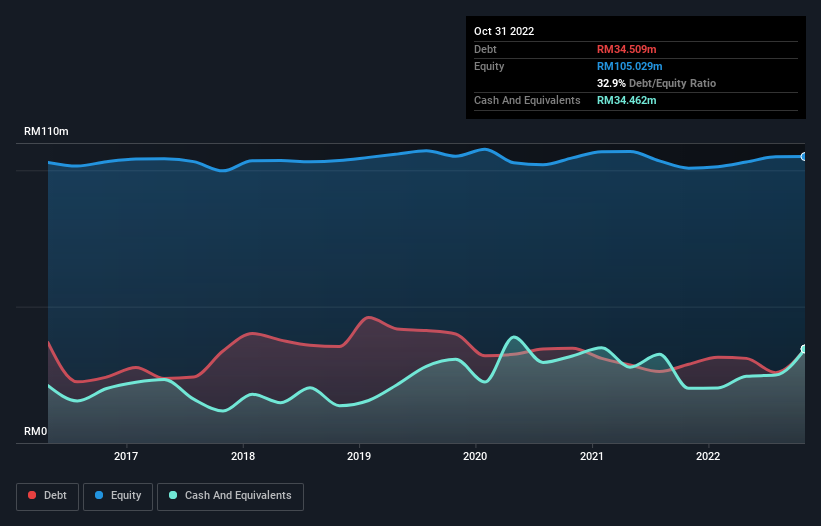- Malaysia
- /
- Auto Components
- /
- KLSE:SAPIND
These 4 Measures Indicate That Sapura Industrial Berhad (KLSE:SAPIND) Is Using Debt Reasonably Well
David Iben put it well when he said, 'Volatility is not a risk we care about. What we care about is avoiding the permanent loss of capital.' When we think about how risky a company is, we always like to look at its use of debt, since debt overload can lead to ruin. As with many other companies Sapura Industrial Berhad (KLSE:SAPIND) makes use of debt. But is this debt a concern to shareholders?
Why Does Debt Bring Risk?
Debt assists a business until the business has trouble paying it off, either with new capital or with free cash flow. Ultimately, if the company can't fulfill its legal obligations to repay debt, shareholders could walk away with nothing. However, a more common (but still painful) scenario is that it has to raise new equity capital at a low price, thus permanently diluting shareholders. By replacing dilution, though, debt can be an extremely good tool for businesses that need capital to invest in growth at high rates of return. When we think about a company's use of debt, we first look at cash and debt together.
See our latest analysis for Sapura Industrial Berhad
What Is Sapura Industrial Berhad's Debt?
As you can see below, at the end of October 2022, Sapura Industrial Berhad had RM34.5m of debt, up from RM28.9m a year ago. Click the image for more detail. On the flip side, it has RM34.5m in cash leading to net debt of about RM47.0k.

How Strong Is Sapura Industrial Berhad's Balance Sheet?
Zooming in on the latest balance sheet data, we can see that Sapura Industrial Berhad had liabilities of RM58.4m due within 12 months and liabilities of RM34.8m due beyond that. Offsetting this, it had RM34.5m in cash and RM42.1m in receivables that were due within 12 months. So its liabilities total RM16.7m more than the combination of its cash and short-term receivables.
Sapura Industrial Berhad has a market capitalization of RM63.0m, so it could very likely raise cash to ameliorate its balance sheet, if the need arose. However, it is still worthwhile taking a close look at its ability to pay off debt. Carrying virtually no net debt, Sapura Industrial Berhad has a very light debt load indeed.
Although Sapura Industrial Berhad made a loss at the EBIT level, last year, it was also good to see that it generated RM13m in EBIT over the last twelve months. There's no doubt that we learn most about debt from the balance sheet. But you can't view debt in total isolation; since Sapura Industrial Berhad will need earnings to service that debt. So if you're keen to discover more about its earnings, it might be worth checking out this graph of its long term earnings trend.
But our final consideration is also important, because a company cannot pay debt with paper profits; it needs cold hard cash. So it is important to check how much of its earnings before interest and tax (EBIT) converts to actual free cash flow. During the last year, Sapura Industrial Berhad generated free cash flow amounting to a very robust 95% of its EBIT, more than we'd expect. That positions it well to pay down debt if desirable to do so.
Our View
The good news is that Sapura Industrial Berhad's demonstrated ability to convert EBIT to free cash flow delights us like a fluffy puppy does a toddler. And the good news does not stop there, as its net debt to EBITDA also supports that impression! When we consider the range of factors above, it looks like Sapura Industrial Berhad is pretty sensible with its use of debt. That means they are taking on a bit more risk, in the hope of boosting shareholder returns. The balance sheet is clearly the area to focus on when you are analysing debt. However, not all investment risk resides within the balance sheet - far from it. For example, we've discovered 3 warning signs for Sapura Industrial Berhad (1 is concerning!) that you should be aware of before investing here.
Of course, if you're the type of investor who prefers buying stocks without the burden of debt, then don't hesitate to discover our exclusive list of net cash growth stocks, today.
New: Manage All Your Stock Portfolios in One Place
We've created the ultimate portfolio companion for stock investors, and it's free.
• Connect an unlimited number of Portfolios and see your total in one currency
• Be alerted to new Warning Signs or Risks via email or mobile
• Track the Fair Value of your stocks
Have feedback on this article? Concerned about the content? Get in touch with us directly. Alternatively, email editorial-team (at) simplywallst.com.
This article by Simply Wall St is general in nature. We provide commentary based on historical data and analyst forecasts only using an unbiased methodology and our articles are not intended to be financial advice. It does not constitute a recommendation to buy or sell any stock, and does not take account of your objectives, or your financial situation. We aim to bring you long-term focused analysis driven by fundamental data. Note that our analysis may not factor in the latest price-sensitive company announcements or qualitative material. Simply Wall St has no position in any stocks mentioned.
About KLSE:SAPIND
Sapura Industrial Berhad
An investment holding company, manufactures, supplies, and sells products for automotive, electronics, and electrical industries in Malaysia.
Solid track record with excellent balance sheet.
Market Insights
Community Narratives



